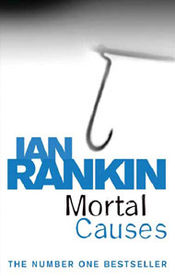
 This week it’s the letter I in the Alphabet of Crime Fiction, and my shelves were empty of possible entries. What an excellent excuse for a trip to the multitude of charity shops in my local high street – I came away with Mortal Causes by Ian Rankin.
This week it’s the letter I in the Alphabet of Crime Fiction, and my shelves were empty of possible entries. What an excellent excuse for a trip to the multitude of charity shops in my local high street – I came away with Mortal Causes by Ian Rankin.
Ian Rankin is one of those authors that I know I’m supposed to like. Constantly in both the bestseller lists and the newspaper book reviews, he has the reputation of a great writer who is also popular – quite a rare thing, as usually it’s one thing or the other (stand up Dan Brown – you know which one he is, unfortunately).
I’ve read some of his work, notably the early books, but they failed to leave much of a mark on me – they were good reads, definitely, but with the exception of Black and Blue, about the heir to Bible John, an Edinburgh serial killer, which creeped me out completely, they kind of washed over me. So to be honest, I wasn’t expecting great things – just a solid read. What a pleasant surprise this book was.
 It took me a while to get into this book. Too often I find that crime novels don’t have enough plot in the central story, so they have to introduce separate, less interesting cases to fill the page count or worse, countless intrusions by the protagonist’s love life. This seemed to be the case here.
It took me a while to get into this book. Too often I find that crime novels don’t have enough plot in the central story, so they have to introduce separate, less interesting cases to fill the page count or worse, countless intrusions by the protagonist’s love life. This seemed to be the case here.
A young man is found executed, paramilitary style, in a cellar in Edinburgh. Almost immediately, Rebus, the detective of the book and most of Rankin’s other books as well, is asked to sort out some trouble on a local estate. Simultaneously, there seems to be a bit of friction in his lovelife. This is probably an unfortunate reflection of my attention span, but if I wasn’t writing this blog, I might have put the book down at this point. However, I didn’t, and I’m really glad of it.
The stories (OK, not the lovelife) dovetailed together fairly quickly and believably and the lovelife part, while irrelevant to the plot, was brief and added some colour to the characters without detracting from the main story. The plot kept moving forward and it came together sensibly and while some elements were predictable, as is often the nature of a book where most characters are criminals or at least crooked, some were not.
 There’s also clearly a bigger arc throughout the series going on as well, notably through the character of the organised crime boss that Rebus put away in an earlier book, but at no point did I feel excluded from some of the action by not having read those books.
There’s also clearly a bigger arc throughout the series going on as well, notably through the character of the organised crime boss that Rebus put away in an earlier book, but at no point did I feel excluded from some of the action by not having read those books.
There’s even a nod to the fair-play mystery as a number of events are foreshadowed, albeit very briefly – usually blink-and-you-miss-it mentions of names of characters who later appear in the book in a different context, although Rebus is kind enough to point out that he noticed it.
Rebus himself is a well-crafted character, although it seems he can act like a bit of an arse on occasion, but he’s charming in a very rough kind of way. I’m pretty sure from the nature of his life that some of the later books will have some very depressing outcomes, but for now, I’ll be keeping an eye open in the charity shops for the next book, Let It Bleed. After all, L is only a couple of weeks away, and this seems like a prime candidate. I think I might be hooked – it may not be a classic mystery, per se, but it’s a bloody good read, nonetheless.

Thanks for pointing to these later Rankin books – like you, I read 2 or 3 when he started getting a lot of early mentions in Time Out and the like but got a bit disinterested as they seemed a bit formulaic and predictable quite quickly (the John Hannah TV version didn’t help much either – the Ken Stott series is much better though).
LikeLike
I’m glad to see you are at least willing to try another Rankin. Thanks also for this contribution to the CFA for I
LikeLike
Oh, I enjoyed this one, don’t get me wrong. I was actually surprised, as I had written off the series as not quite my cup of tea, so a big thank you to a) the Mystery Alphabet and b) the local Cancer Research shop for combining to allow me to give Ian Rankin another try.
LikeLike